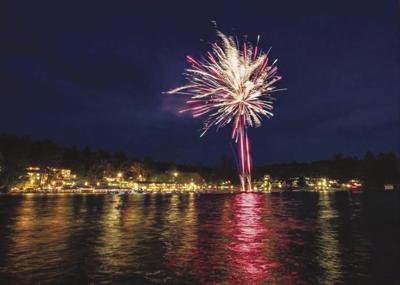Fireworks have been a staple of celebration in America since the early days of our history, with the first recorded illuminated display in Philadelphia on July 4, 1777, and their origins trace back even further to between 600 and 900 CE. This week, as colorful explosions light up the night sky in celebration of over 200 years of freedom, these displays look much different than the simple displays our forefathers enjoyed. Amidst the "oohs'' and "aahs" that echo across the lake, the hidden consequences of these celebrations often remain unnoticed. While fireworks provide stunning visuals and a fun festive atmosphere, their impact on our waterbodies can be significant.
The most basic component of fireworks is black powder, made up of potassium nitrate, charcoal and sulfur — but that’s not very exciting. To create a colorful display, additional chemicals are needed such as strontium, sodium, and barium. Other heavy metals like aluminum and manganese act as stabilizers and oxidizers or add extra color. Once launched, these chemicals deposit directly into waterbodies or can contaminate groundwater. Additionally, the debris left behind can be coated with these same chemicals causing concern for human health and aquatic life.
Perchlorate, naturally occurring in small amounts, is used to assist in the propulsion of fireworks. At sufficient doses, perchlorate can disrupt normal functioning of the thyroid gland in humans and wildlife. Currently, there are no federal regulations for the use of perchlorate, although EPA has committed to issuing regulations by May 2027. Massachusetts is one of a few states in the country to establish specific regulations for perchlorate in drinking water, setting the limit at 2 µg/L after the compound was detected in the Bourne Water District’s drinking water wells.
The Lake Winnipesaukee Association is participating in a nationwide water quality monitoring study in collaboration with the North American Lake Management Society (NALMS) to assess the perchlorate occurrence in Lake Winnipesaukee before and after the Fourth of July. Thanks to the help of some dedicated volunteers, LWA is coordinating three sampling events in five locations on Lake Winni: Alton, Center Harbor, Meredith, Wolfeboro and the Weirs. Other lake associations in the Lakes Region are participating as well.
If you decide to launch fireworks, please clean up any debris left behind. Try to avoid launching them over lakes and streams, or areas that drain directly to our waterbodies. Lastly, if you do launch close to the lake, please collect debris by hand and do not use tools to rake the shorefront as this can disturb the sediment and add nutrients into the water, potentially fueling blue-green algae blooms.
While fireworks are a beloved tradition, it is important to be mindful of their impact. Other communities, like Sunapee and Lebanon, are switching to laser light shows as an eco-friendly, safer, and quieter alternative to fireworks. By considering such alternatives, taking simple steps to minimize debris, and avoiding the launch of fireworks over waterbodies, we can help protect our lakes and streams.
•••
Bree Rossiter is the conservation program manager for the Lake Winnipesaukee Association. She manages the water quality monitoring program, cyanobacteria monitoring initiatives, the Winni Blue/LakeSmart program, and assists with watershed management planning efforts. Bree can be reached at brossiter@winnipesaukee.org. The Lake Winnipesaukee Association is a nonprofit dedicated to protecting the water quality and natural resources of the lake and its watershed. To learn more, visit winnipesaukee.org.


















(1) comment
What about the chemicals used on the roads in the Winter? 10,000 times worse
Welcome to the discussion.
Log In
Keep it Clean. Please avoid obscene, vulgar, lewd, racist or sexually-oriented language.
PLEASE TURN OFF YOUR CAPS LOCK.
Don't Threaten. Threats of harming another person will not be tolerated.
Be Truthful. Don't knowingly lie about anyone or anything.
Be Nice. No racism, sexism or any sort of -ism that is degrading to another person.
Be Proactive. Use the 'Report' link on each comment to let us know of abusive posts.
Share with Us. We'd love to hear eyewitness accounts, the history behind an article.